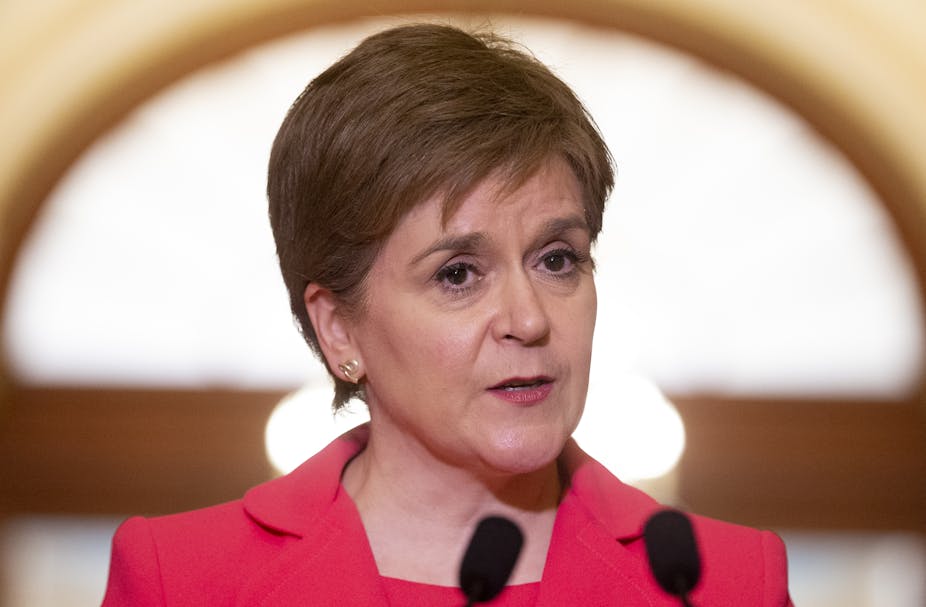From calls for a second Scottish independence referendum and speculation about “indy-curiousity” in Wales, to the collapse of the power-sharing agreement in Northern Ireland, the state of the UK union has been the subject of much political discussion over the past decade.
Traditionally, devolution has followed a so-called devolve and forget model. The UK parliament transfers law making power to the devolved legislatures to exercise as they see fit, as long as they do so within the defined limits.
However, the UK government’s recent blocking of Scotland’s gender recognition bill suggests political and legal relationships are being tested, and maybe even reshaped.
The fallout over Scotland’s gender recognition bill has not happened in isolation. It is important to understand the events which have led to recent headlines declaring the UK is heading for a “constitutional crisis”.
Brexit
Since 2016 the UK has seen heightened pressure on relationships within the union.
The Brexit referendum highlighted differences among the UK’s nations and regions, for example Scotland’s 62% and Northern Ireland’s 55.8% vote to remain within the EU. These differences weren’t recognised by the ultimate decision to pull the UK completely out of the EU (with some exceptions for Northern Ireland).
Similarly, the pandemic led to a period of more prominent policy differences between the four nations, highlighting how the devolved governments diverged from Westminster.
Then came the UK Internal Market Act in late 2020. With the UK no longer bound by EU law, there was a post-Brexit risk that nations could make different rules for devolved areas, such as agriculture. This could have created new trade barriers between different parts of the UK, as well as making pursuing new international trade agreements more difficult.
The Scottish and Welsh governments opposed the act’s approach. Nonetheless, in implementing a common standard for the whole of the UK, ministers in Westminster now have control over traditionally devolved areas under the new law.
Last year, the Scottish government’s push for a second independence referendum ended up at the supreme court, which ruled Holyrood didn’t have the power to hold such a vote. This reasserted the legal dominance of Westminster in deciding if, and when, such a question may be put to the people of Scotland once more.
Meanwhile in Wales, there have been heated exchanges in the Senedd between First Minister Mark Drakeford and Conservative members regarding the leadership of the UK and devolved funding models, particularly in relation to the financing of the NHS.
In Northern Ireland, the power-sharing government collapsed again in October. This time due to disagreements over the UK’s new relationship with the EU. The situation shows little sign of being resolved. Specifically, the Democratic Unionist Party continues to block power-sharing in protest at post-Brexit trading arrangements, which treat Northern Ireland differently to the rest of the UK.
These various events show the working relationships between the UK’s different governments are under renewed pressure. In turn, instead of reaching political compromise through intergovernmental working, the UK government has responded by relying on its law-making dominance.
Law v politics
Last week, and for the first time, the UK government decided to invoke section 35 of the Scotland Act to block Scotland’s gender recognition bill. These proposals were designed to make it easier for people in Scotland to change their legal gender. However, they have been halted by the UK government on the grounds they would affect equality law for the whole of the UK, and are therefore a reserved matter for Westminster.
The UK government insists it has not used its powers lightly, and does all it can to “respect the devolution settlement”. Yet Nicola Sturgeon has alleged the UK government is denying Scotland its democracy.
Drakeford told the Senedd the block is a “dangerous precedent” and that he planned to emulate the Scottish gender recognition legislation. However, it is likely that the UK government would similarly veto any Senedd laws in this area. Drakeford also suggested the Welsh government may be party to any supreme court action by the Scottish government.
If the supreme court finds gender recognition is within the scope of equality law, and necessitates a UK-wide approach, the legal reality of any court action by the Scottish government is likely to follow a similar approach to previous cases. In other words, the law-making dominance of Westminster will prevail.
While section 35 has never been invoked before, it is part of the foundation for the Scottish parliament’s legal framework. If Wales tried to adopt a similar law to Scotland’s gender recognition bill, it is likely that similar action would be taken by the UK government, given the provisions within the Government of Wales Act.

This does not mean the UK government’s decision on the Scottish bill is without constitutional ramifications. Drakeford has described the use of legal power against the Scottish government as a “slippery slope”, in which the UK government is increasingly reliant on legal dominance, rather than respect and dialogue.
For nearly 20 years, governments of every political persuasion respected the Sewel convention. This is a principle stating the UK parliament will not normally legislate in respect of a devolved matter without the devolved government’s consent. While it has been ruled the convention is not legally enforceable, it exists to ensure the decisions of devolved governments are respected by the UK government.
However the 2016 Brexit referendum set a new precedent for these working relationships. The Scottish parliament withheld consent for the EU (Withdrawal) Act, which removed the influence of the EU institutions in the UK and paved the way for cutting off sources of EU law via the ‘great repeal’.
All three devolved nations also withheld consent for the EU (Withdrawal Agreement) Act, the law that was needed to ratify the Brexit withdrawal agreement negotiated between the UK and EU. Nonetheless, both were still passed by the UK parliament.
The UK government’s veto of Scotland’s gender recognition bill is arguably a further shift away from conventions and reliance upon legal force.

